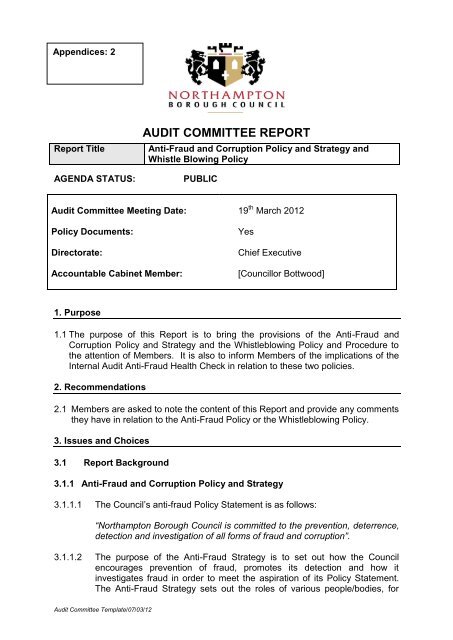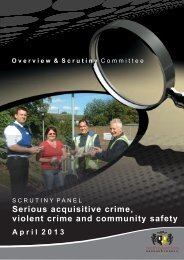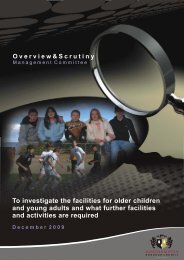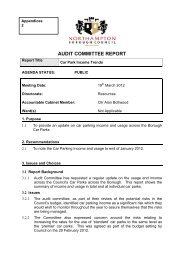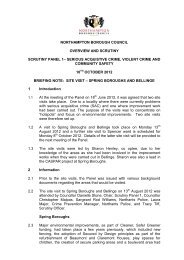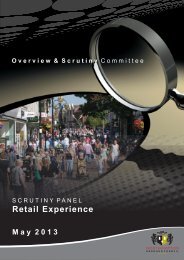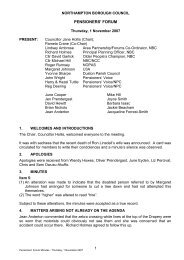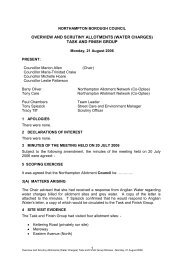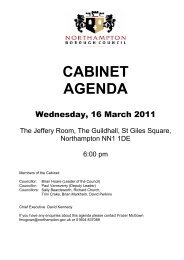Anti Fraud and Corruption policy - Northampton Borough Council
Anti Fraud and Corruption policy - Northampton Borough Council
Anti Fraud and Corruption policy - Northampton Borough Council
Create successful ePaper yourself
Turn your PDF publications into a flip-book with our unique Google optimized e-Paper software.
Appendices: 2<br />
Report Title<br />
AGENDA STATUS:<br />
AUDIT COMMITTEE REPORT<br />
<strong>Anti</strong>-<strong>Fraud</strong> <strong>and</strong> <strong>Corruption</strong> Policy <strong>and</strong> Strategy <strong>and</strong><br />
Whistle Blowing Policy<br />
PUBLIC<br />
Audit Committee Meeting Date:<br />
Policy Documents:<br />
Directorate:<br />
Accountable Cabinet Member:<br />
19 th March 2012<br />
Yes<br />
Chief Executive<br />
[<strong>Council</strong>lor Bottwood]<br />
1. Purpose<br />
1.1 The purpose of this Report is to bring the provisions of the <strong>Anti</strong>-<strong>Fraud</strong> <strong>and</strong><br />
<strong>Corruption</strong> Policy <strong>and</strong> Strategy <strong>and</strong> the Whistleblowing Policy <strong>and</strong> Procedure to<br />
the attention of Members. It is also to inform Members of the implications of the<br />
Internal Audit <strong>Anti</strong>-<strong>Fraud</strong> Health Check in relation to these two policies.<br />
2. Recommendations<br />
2.1 Members are asked to note the content of this Report <strong>and</strong> provide any comments<br />
they have in relation to the <strong>Anti</strong>-<strong>Fraud</strong> Policy or the Whistleblowing Policy.<br />
3. Issues <strong>and</strong> Choices<br />
3.1 Report Background<br />
3.1.1 <strong>Anti</strong>-<strong>Fraud</strong> <strong>and</strong> <strong>Corruption</strong> Policy <strong>and</strong> Strategy<br />
3.1.1.1 The <strong>Council</strong>‟s anti-fraud Policy Statement is as follows:<br />
“<strong>Northampton</strong> <strong>Borough</strong> <strong>Council</strong> is committed to the prevention, deterrence,<br />
detection <strong>and</strong> investigation of all forms of fraud <strong>and</strong> corruption”.<br />
3.1.1.2 The purpose of the <strong>Anti</strong>-<strong>Fraud</strong> Strategy is to set out how the <strong>Council</strong><br />
encourages prevention of fraud, promotes its detection <strong>and</strong> how it<br />
investigates fraud in order to meet the aspiration of its Policy Statement.<br />
The <strong>Anti</strong>-<strong>Fraud</strong> Strategy sets out the roles of various people/bodies, for<br />
Audit Committee Template/07/03/12
example, employees, managers, Members, internal audit <strong>and</strong> external<br />
audit in preventing, detecting, deterring <strong>and</strong> investigating fraud. The <strong>Anti</strong>-<br />
<strong>Fraud</strong> Strategy also sets out some of the legislation <strong>and</strong> other <strong>Council</strong><br />
policies that may need to be taken into account in any fraud investigation<br />
carried out by the <strong>Council</strong>.<br />
3.1.1.3 The <strong>Anti</strong>-<strong>Fraud</strong> <strong>and</strong> <strong>Corruption</strong> Policy <strong>and</strong> Strategy (which is held on both<br />
the intranet <strong>and</strong> internet) is attached as Appendix 1 for Members‟<br />
information.<br />
3.1.1.4 The <strong>Anti</strong>-<strong>Fraud</strong> <strong>and</strong> <strong>Corruption</strong> Policy <strong>and</strong> Strategy is reviewed <strong>and</strong><br />
updated by the <strong>Borough</strong> Solicitor <strong>and</strong> Monitoring Officer at least yearly.<br />
(The next review will take place shortly <strong>and</strong> will in particular update the<br />
Policy <strong>and</strong> Strategy to reflect the fact that the Bribery Act 2010 is now in<br />
force).<br />
3.1.2 Whistleblowing Policy <strong>and</strong> Procedure<br />
3.1.2.1 The Whistleblowing Policy <strong>and</strong> Procedure is part of the <strong>Council</strong>‟s <strong>Anti</strong>-<br />
<strong>Fraud</strong> Strategy <strong>and</strong> is attached as Appendix 2. Its purpose is to set out<br />
the procedure to be followed when an employee discloses suspected<br />
wrongdoing, malpractice, irregularity, fraud or corruption. <strong>Council</strong><br />
employees need to be able to disclose allegations of malpractice within the<br />
<strong>Council</strong> knowing that their allegations will be considered <strong>and</strong> dealt with as<br />
appropriate. Employees also need to be confident that they will not be<br />
victimised or otherwise vulnerable as a result of having made such<br />
allegations.<br />
3.1.2.2 It should be noted that although the Whistleblowing Policy <strong>and</strong> Procedure<br />
deals specifically with employees „blowing the whistle‟, it is clear in the<br />
<strong>Anti</strong>-<strong>Fraud</strong> <strong>and</strong> <strong>Corruption</strong> Policy that members of the public are also<br />
encouraged to blow the whistle if they suspect any wrongdoing in the<br />
<strong>Council</strong>. As Members may be aware, there is a „Whistleblowing Hotline‟<br />
telephone number to enable staff or members of the public to easily report<br />
any suspicions of fraud or corruption to the Monitoring Officer.<br />
3.1.2.3 The Monitoring Officer has oversight of all matters arising from a<br />
whistleblowing disclosure <strong>and</strong> keeps a whistleblowing register.<br />
3.1.2.4 The Whistleblowing Policy <strong>and</strong> Procedure (which is held on both the<br />
intranet <strong>and</strong> internet) is attached as Appendix 2 for Members‟ information.<br />
3.1.3 <strong>Anti</strong>-<strong>Fraud</strong> Health Check 2011 / 2012<br />
3.1.3.1 In November 2011, the <strong>Council</strong>‟s internal auditors,<br />
PricewaterhouseCoopers LLP (“PwC”) carried out an „<strong>Anti</strong>-<strong>Fraud</strong> Health<br />
Check‟. PwC concluded that overall, the <strong>Council</strong> has a number of good<br />
anti-fraud policies <strong>and</strong> programmes in place <strong>and</strong> that senior management<br />
recognise the importance of developing <strong>and</strong> maintaining an anti-fraud<br />
culture. They also found that there is a clear underst<strong>and</strong>ing that<br />
awareness of corporate fraud risks across the organisation is a significant<br />
contributor to good governance.<br />
Audit Committee Template/07/03/12
3.1.3.2 The PwC <strong>Anti</strong>-<strong>Fraud</strong> Health Check also results in a number of<br />
recommendations which highlight areas where work to strengthen the<br />
<strong>Council</strong>‟s anti-fraud framework should be considered. The <strong>Council</strong> is<br />
currently considering <strong>and</strong> responding to these recommendations. PwC‟s<br />
recommendations <strong>and</strong> the <strong>Council</strong>‟s management responses are<br />
summarised in the table below.<br />
PwC Recommendations <strong>and</strong><br />
Comments<br />
<strong>Council</strong>’s Management Responses<br />
<strong>Fraud</strong> risk assessments should<br />
be undertaken - The suggestion is<br />
that the <strong>Council</strong> should undertake a<br />
high level fraud risk assessment to<br />
consider the key fraud risks facing<br />
the authority. This should be<br />
followed by more detailed<br />
assessments in operational areas<br />
considered to be at higher risk of<br />
exposure to fraud, (for example<br />
procurement).<br />
o <strong>Fraud</strong> risks to be included as part of the risk<br />
management process which will conduct detailed<br />
operational area assessments.<br />
o Advice will be provided to Heads of Service in<br />
including fraud risk consideration as part of the<br />
service planning process.<br />
o High level fraud risk assessment to be undertaken<br />
<strong>and</strong> reviewed annually.<br />
<strong>Fraud</strong> awareness should be<br />
included as part of the staff<br />
induction process.<br />
o Initial fraud awareness to be delivered through the<br />
identification of fraud risks in the initial fraud risk<br />
assessment.<br />
o An anti-fraud awareness training package<br />
(including e-learning) to be implemented.<br />
o Housing Benefit <strong>and</strong> <strong>Council</strong> Tax Benefit fraud<br />
awareness training to be given to all Revenues <strong>and</strong><br />
Benefits staff <strong>and</strong> relevant Housing <strong>and</strong> Customer<br />
Services staff. Such training to be given to newstarters<br />
<strong>and</strong> refresher training to be provided on an<br />
ad hoc basis.<br />
o Consideration of an anti-fraud<br />
overview to be included in induction training.<br />
A <strong>Fraud</strong> Register should be<br />
developed in order that the<br />
<strong>Council</strong> has oversight of the<br />
extent of attempted frauds –<br />
Although the Audit Committee<br />
receives an annual report detailing<br />
benefits fraud, there are no reports<br />
currently sent to the Committee<br />
detailing corporate fraud (either<br />
attempted or actual).<br />
o A Corporate <strong>Fraud</strong> Register will be set up to record<br />
all instances of fraud except benefit fraud which is<br />
included on a specific register.<br />
o An high level risk assessment will be reported to<br />
Audit Committee at least annually.<br />
o The necessity for a fraud case management<br />
system will be investigated.<br />
o Whistleblowing data will be transferred onto the<br />
Corporate <strong>Fraud</strong> Register.<br />
o <strong>Fraud</strong> awareness initiatives will be undertaken from<br />
April 2012.<br />
Audit Committee Template/07/03/12
3.2 Issues<br />
3.2.1 There are no specific issues. Members are asked to provide any comments<br />
on the <strong>Anti</strong>-<strong>Fraud</strong> <strong>and</strong> <strong>Corruption</strong> Policy <strong>and</strong> Strategy, the Whistleblowing<br />
Policy <strong>and</strong> Procedure <strong>and</strong> the <strong>Council</strong>‟s Management responses to PwC‟s<br />
recommendations.<br />
3.3 Choices (Options)<br />
Not applicable.<br />
4. Implications (including financial implications)<br />
4.1 Policy<br />
4.1.1 N/A<br />
4.2 Resources <strong>and</strong> Risk<br />
4.2.1 None<br />
4.3 Legal<br />
4.3.1 Any legal implications are outlined in the body of this report <strong>and</strong> the<br />
appendices.<br />
4.4 Equality<br />
4.4.1 N/A<br />
4.5 Consultees (Internal <strong>and</strong> External)<br />
4.5.1 None.<br />
4.6 Other Implications<br />
4.6.1 None.<br />
5. Background Papers<br />
5.1 <strong>Northampton</strong> <strong>Borough</strong> <strong>Council</strong> <strong>Anti</strong>-<strong>Fraud</strong> Health Check 2011/2012, Draft<br />
Report, (PwC).<br />
Report Author: Francis Fern<strong>and</strong>es.<br />
Audit Committee Template/07/03/12


